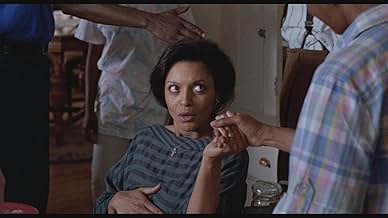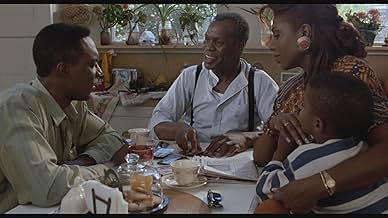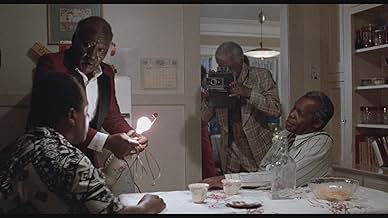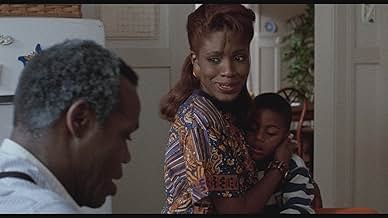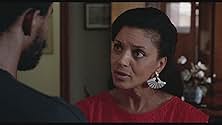To Sleep with Anger
- 1990
- Tous publics
- 1h 42m
IMDb RATING
7.1/10
3.3K
YOUR RATING
A charismatic old acquaintance drifts into town, stirring up trouble for a mild-mannered family.A charismatic old acquaintance drifts into town, stirring up trouble for a mild-mannered family.A charismatic old acquaintance drifts into town, stirring up trouble for a mild-mannered family.
- Awards
- 7 wins & 13 nominations total
DeVaughn Nixon
- Sunny
- (as Devaughn Walter Nixon)
DeForest Covan
- Fred Jenkins
- (as DeForest Coven)
- Director
- Writer
- All cast & crew
- Production, box office & more at IMDbPro
Featured reviews
What a strange, powerful, unsettling and unique film. If you want to experience the tingling of terror, than over the course of 97 minutes becomes more and more apparent, this might be the film for you. Some of it is more ambition than execution. Sometimes it tries to be a bit too profound, and some of the acting is a bit low key, but I have never seen anything like this in my life.
We first she him in the shape of an old friend. We hear a knock on the door and in comes Harry, the family friend who hasn't set a foot in the town for 30 years. He makes it clear that he was heading somewhere else, but needed a rest after a long bus ride. The old married couple invites him to stay, but our friend Harry never leave. He seems so friendly, but one on one he can make the most unsettling remarks that would crawl under the skin of anybody.
His past could very well be covered with blood, and his present surroundings starts to descend into hell. Danny Glover plays the magnetic and devilish persona, and this is certainly his magnum opus. Never seen such an enigmatic and bigger than life performance from him, and few could match it. Some become his disciples, others look at his with hate. It's built around, or perhaps within the mystique between old folklore, superstition and religion Some of it is slightly simple minded. And it's allusions to the devil and the battle between good and evil might seem a tad forced. But this is certainly one for the books.
We first she him in the shape of an old friend. We hear a knock on the door and in comes Harry, the family friend who hasn't set a foot in the town for 30 years. He makes it clear that he was heading somewhere else, but needed a rest after a long bus ride. The old married couple invites him to stay, but our friend Harry never leave. He seems so friendly, but one on one he can make the most unsettling remarks that would crawl under the skin of anybody.
His past could very well be covered with blood, and his present surroundings starts to descend into hell. Danny Glover plays the magnetic and devilish persona, and this is certainly his magnum opus. Never seen such an enigmatic and bigger than life performance from him, and few could match it. Some become his disciples, others look at his with hate. It's built around, or perhaps within the mystique between old folklore, superstition and religion Some of it is slightly simple minded. And it's allusions to the devil and the battle between good and evil might seem a tad forced. But this is certainly one for the books.
"To Sleep with Anger" It is one of the richest film experiences I've had in a very long time. Since I saw it in 1993, no other American film has seemed as winning and varied as this one. It is a film I return to again and again, for the brilliant ensemble cast, the witty writing and the blend of humor, folklore and tragedy. There are no cinematic pyrotechnics. Mr. Burnett's approach to filmmaking is deceptively simple and yet his film seems far richer and more cinematic than many a more "sophisticated filmmaker". Mr. Burnett has taste and economy. He knows where to place his camera for the greatest effect and how to edit his films in a way that enhances the drama of each scene, rather than using edits to manufacture drama in a scene that is dramatically inert. He is a filmmaker of integrity and genius. This is his masterpiece.
This film reminded me a bit of some of Toni Morrison's novels-about the shared heritage of American descendants of slaves, the grief and the magic. The film begins in a Black neighborhood that is if anything a more virtuous reflection of postwar middle-class white neighborhoods: neatly-kept bungalows with big yards, kids playing in the street (and with pigeons on the rooftop) and practicing musical instruments (a trumpet, in this case), a paterfamilias who keeps chickens and irons his own slacks, a mother who supplements her shopping with produce from her own garden and works as a midwife, two handsome sons with wives and a (quiet, respectful) child each.... The main problem is that the younger son's wife is bored silly by the agricultural table-talk at Sunday dinner: she sells real estate, and that is what land is to her. Also, the roof leaks, and the two sons can't get together to fix it.
Then Gideon remarks that he can't find his "toby" (thank you, subtitles, and also Wikipedia for mentioning this as a synonym of a mojo), a teapot with marbles in it falls to the floor and breaks, and Harry arrives. Harry is from that place in the South from which Gideon and Suzie emigrated when their sons were children. Harry is the drinking, gambling, womanizing friend who keeps his possessions in a few cardboard boxes instead of a bungalow. He draws to him a whole crowd of Gideon's fellow emigrés, mostly men, and with them comes fierce misogyny and the potential for violence.
Enough with the plot summary. This is a rich and entertaining film. I see that many of the other reviews are from this very month, so I guess it has just started streaming.
Then Gideon remarks that he can't find his "toby" (thank you, subtitles, and also Wikipedia for mentioning this as a synonym of a mojo), a teapot with marbles in it falls to the floor and breaks, and Harry arrives. Harry is from that place in the South from which Gideon and Suzie emigrated when their sons were children. Harry is the drinking, gambling, womanizing friend who keeps his possessions in a few cardboard boxes instead of a bungalow. He draws to him a whole crowd of Gideon's fellow emigrés, mostly men, and with them comes fierce misogyny and the potential for violence.
Enough with the plot summary. This is a rich and entertaining film. I see that many of the other reviews are from this very month, so I guess it has just started streaming.
Charles Burnett is the unsung vanguard of African-American cinema, who starts his career years before Spike Lee, yet whose output is far less prolific, TO SLEEP WITH ANGER is only his third feature, after KILLER OF SHEEP (1978) and MY BROTHER'S WEDDING (1983).
The life of South Los Angeles inhabitants Gideon and Suzie (Butler and Alice) starts to unravel when an old friend from the South, Harry (Glover) blows in one day, out of hospitality and bonhomie, they invite Harry to stay as long as he wishes. After backhanded remarks questioning the philanthropic work of Gideon and Suzie's elder son Junior (Lumbly) and his wife Pat (McGee), who is gravid with a baby number two, Harry finds his perfect target in Gideon and Suzie's younger son Samuel aka. Baby Brother (Brooks), whose immaturity, trivial grievance and maladaptive fatherhood gives the access of Harry's macho, wheedling male-bonding of going back to the South, which brings tension between Baby Brother and his family, especially with his wife Linda (Ralph), who is haplessly juggling between her career and traditional drudgery assigned to a wife, child-rearing and domestic chores.
Bad omen foreshadows Harry's arrival, the opening surreal self-combusted metaphor and the breaking of Gideon's charm all presage that it is a hostage to fortune to allow Harry overstaying his welcome. In Burnett's progressive thinking, there isn't much gray zone in the tradition versus urbanization tug-of-war, Harry, an incarnation of the vileness of a hidebound mindset (characterized by male chauvinism and superstition), is a menace with an elusive ulterior motive, and Danny Glover submerses deeply into Harry's dark side with a simian, hail-fellow-well-met expansiveness that is only betrayed by his piercing, menacing glint, shrouded in a mystical aura, he is mesmeric enough to hold our attention, but we have no idea what is he up to, because gradually Harry is reduced to a symbol, an unequivocal bad influence, which makes his comeuppance a bit blunt, if there is any redeeming feature in him, it is totally under our radar.
Above all, TO SLEEP WITH ANGER is an ensemble piece, great performances are actualized, barring the top-billing Glover, also by its distaff players: Mary Alice, who is not just a devoted wife, a capable ob-gyn doctor, but also a witty and sensible mother, and knows how to live up to be the pillar of the household when the crunch befalls; Sheryl Lee Ralph, whose suffering wife of a man-child is mostly poignant, and Ethel Ayler, who plays Hattie, an old acquaintance whose newborn faith projects a searing antagonism against Harry even before he reveals his true colors. Good impression is dwindled on the man's front, Paul Butler's Gideon is taken to his bed most of the time, Carl Lumbly is prone to be an empty vessel (by making the most noise) and Richard Brooks has the juiciest role, but is squandered by a script which portrays him as the good-for-nothing every has to condone with.
That said, TO SLEEP WITH ANGER deserves to be seen by a larger demography (it is a 4-times Independent Spirit winner if that doesn't mean nothing), for its steady deconstruction-and-reconstruction of familial bonds, for its unpretentious ethnic portrayal, and most prominently, for Burnett's unorthodox, pragmatic perspective on African-Americans' assimilation and adjustment in a modern society.
The life of South Los Angeles inhabitants Gideon and Suzie (Butler and Alice) starts to unravel when an old friend from the South, Harry (Glover) blows in one day, out of hospitality and bonhomie, they invite Harry to stay as long as he wishes. After backhanded remarks questioning the philanthropic work of Gideon and Suzie's elder son Junior (Lumbly) and his wife Pat (McGee), who is gravid with a baby number two, Harry finds his perfect target in Gideon and Suzie's younger son Samuel aka. Baby Brother (Brooks), whose immaturity, trivial grievance and maladaptive fatherhood gives the access of Harry's macho, wheedling male-bonding of going back to the South, which brings tension between Baby Brother and his family, especially with his wife Linda (Ralph), who is haplessly juggling between her career and traditional drudgery assigned to a wife, child-rearing and domestic chores.
Bad omen foreshadows Harry's arrival, the opening surreal self-combusted metaphor and the breaking of Gideon's charm all presage that it is a hostage to fortune to allow Harry overstaying his welcome. In Burnett's progressive thinking, there isn't much gray zone in the tradition versus urbanization tug-of-war, Harry, an incarnation of the vileness of a hidebound mindset (characterized by male chauvinism and superstition), is a menace with an elusive ulterior motive, and Danny Glover submerses deeply into Harry's dark side with a simian, hail-fellow-well-met expansiveness that is only betrayed by his piercing, menacing glint, shrouded in a mystical aura, he is mesmeric enough to hold our attention, but we have no idea what is he up to, because gradually Harry is reduced to a symbol, an unequivocal bad influence, which makes his comeuppance a bit blunt, if there is any redeeming feature in him, it is totally under our radar.
Above all, TO SLEEP WITH ANGER is an ensemble piece, great performances are actualized, barring the top-billing Glover, also by its distaff players: Mary Alice, who is not just a devoted wife, a capable ob-gyn doctor, but also a witty and sensible mother, and knows how to live up to be the pillar of the household when the crunch befalls; Sheryl Lee Ralph, whose suffering wife of a man-child is mostly poignant, and Ethel Ayler, who plays Hattie, an old acquaintance whose newborn faith projects a searing antagonism against Harry even before he reveals his true colors. Good impression is dwindled on the man's front, Paul Butler's Gideon is taken to his bed most of the time, Carl Lumbly is prone to be an empty vessel (by making the most noise) and Richard Brooks has the juiciest role, but is squandered by a script which portrays him as the good-for-nothing every has to condone with.
That said, TO SLEEP WITH ANGER deserves to be seen by a larger demography (it is a 4-times Independent Spirit winner if that doesn't mean nothing), for its steady deconstruction-and-reconstruction of familial bonds, for its unpretentious ethnic portrayal, and most prominently, for Burnett's unorthodox, pragmatic perspective on African-Americans' assimilation and adjustment in a modern society.
One good role for Danny Glover can erase the memory of several 'Lethal Weapon' and 'Predator' sequels, but it took a small, independently produced feature to bring the best out of one of Hollywood's hardest working actors. In this modest comedy Glover plays an enigmatic travelin' man named Harry, arriving unannounced at the home of some old friends and adding a subtle tension to the domestic friction already eroding three generations of family ties. But the trouble with Harry is less what he is than what he represents: the ghost of old traditions lurking in the cultural closet, and for a family already sensitive to portents and omens he might be the embodiment of all their superstitions. Writer director Charles Burnett keeps the viewer on guard with his elusive plot and complex characters, but the film is understated almost to a fault. The metaphors and hidden meanings (better suited to a stage play) help create a portentous mood, but in the end leave a lot unexplained.
Did you know
- TriviaIn 2017, the film was selected for preservation in the United States National Film Registry by the Library of Congress as being "culturally, historically, or aesthetically significant".
- Quotes
Harry: Ya, but you can't do the shuffle with one leg. You and your wife, in fortunate. Now I'm not talking about you and what you do but some folks that always run to help the victim, deep down are attracted to pain and suffering and love to be near the dying.
Junior: All the people working with us are really doing it 'cause they hate to see suffering.
Harry: You never know what's in the heart and just because you can cry doesn't make you human.
- ConnectionsReferenced in Siskel & Ebert & the Movies: Congo/The Glass Shield/Pocahontas/Fluke (1995)
- SoundtracksPrecious Memories
Traditional, attributed to J.B.F. Wright
Performed by Sister Rosetta Tharpe (as Sister Rosetta Thorpe)
Courtesy of SAVOY Records
- How long is To Sleep with Anger?Powered by Alexa
Details
Box office
- Gross US & Canada
- $1,161,135
- Opening weekend US & Canada
- $19,295
- Oct 14, 1990
- Gross worldwide
- $1,161,135
- Runtime
- 1h 42m(102 min)
- Color
- Sound mix
- Aspect ratio
- 1.85 : 1
Contribute to this page
Suggest an edit or add missing content


